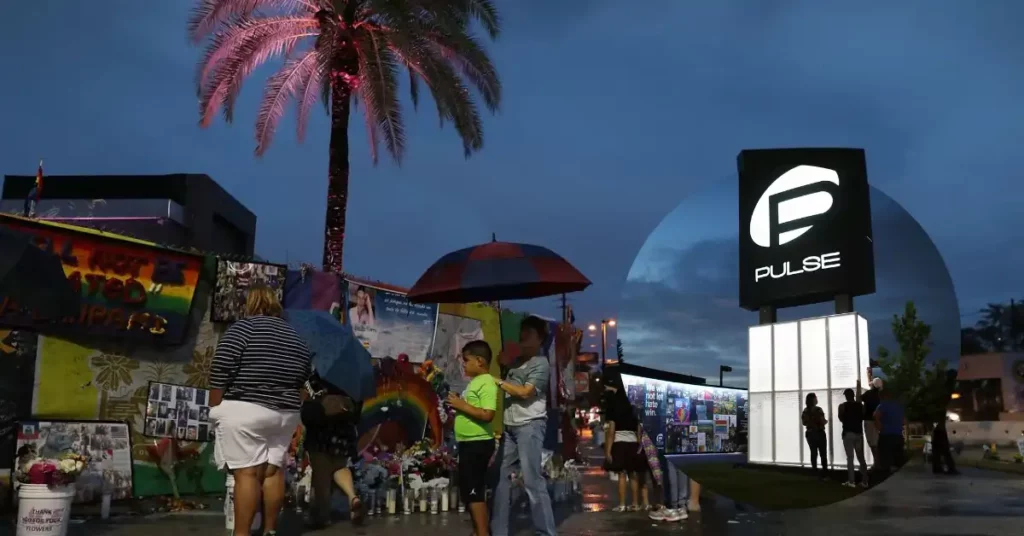Pulse was a gay nightclub in Orlando, Florida that became the site of one of the deadliest mass shootings in US history. On June 12, 2016, a gunman killed 49 people and wounded 53 others at the club hosting a Latin night. The attack was the second worst terrorist attack on US soil since September 11, 2001, and the worst act of violence against the LGBTQ community in the country.
The History of Pulse
Pulse was founded in 2004 by Barbara Poma and Ron Legler, named after Poma’s brother John, who died of AIDS in 1991. The club was meant to honor his memory and his “pulse to live on” Pulse was more than just a gay bar; it was a community hub for HIV prevention, breast cancer awareness, immigrant rights, and other social causes.
Pulse hosted themed performances, drag shows, erotic dancers, and educational events for the LGBTQ community and its allies. Pulse was known for its modern decor, great lighting and sound, and gorgeous dancers. It was one of the most popular and well-reviewed gay clubs in Orlando, and the only one mentioned in The Rough Guide to the USA.
The Night of the Massacre
On June 12, 2016, Pulse celebrated its Latin night, attracting many LGBTQ people of color, especially Puerto Ricans. Around 2 a.m., Omar Mateen entered the club armed with an AR-15-style assault rifle and a pistol. He opened fire on the crowd of about 300 people, killing 49 and injuring 53. He also took hostages in a bathroom and exchanged fire with police officers who arrived at the scene. After a three-hour standoff, police breached the bathroom wall and killed Mateen.
The motive of the shooter remains unclear. He had pledged allegiance to the Islamic State during a 911 call but also expressed support for other Islamist groups that were enemies of ISIS. He had also visited other gay venues and used gay dating apps, raising questions about his sexuality and possible self-hatred. He had also abused his ex-wife and had a history of mental health issues.
The massacre shocked and saddened the nation and the world. It sparked vigils, tributes, donations, and calls for action. It also highlighted the vulnerability and resilience of the LGBTQ community, especially people of color, who faced discrimination, violence, and marginalization.
Check out some other new content we’ve published:
- John Mulaney Divorce: What Happened to John Mulaney and Anna Marie Tendler’s Marriage?
- The Ross Family: Cherishing Memories and Close-Knit Connections
The Legacy of Pulse
In the aftermath of the tragedy, Pulse became a symbol of hope and healing for many people. Survivors, families, friends, and supporters gathered at the site to mourn, remember, and honor the victims. They left flowers, candles, flags, signs, and other items that formed a makeshift memorial. They also shared stories, hugs, prayers, and songs.
Pulse also became a catalyst for change and activism. Many people donated blood, money, and other resources to help the survivors and their families. Many celebrities, politicians, religious leaders, and organizations expressed solidarity and support for the LGBTQ community.
Many people also advocated for stricter gun control laws, better mental health care, and more protection for LGBTQ rights. In 2018, Poma announced plans to create a permanent memorial and museum at the site of Pulse. She formed a nonprofit organization called the onePULSE Foundation to oversee the project.
The foundation held an international design competition and selected a team led by French firm Coldefy & Associés to create the memorial. The design features a reflecting pool with 49 rainbow-colored fountains representing the victims; a tranquil garden with 49 trees; a spiraling tower with an open-air museum; and an education center with exhibits and programs. The memorial is expected to open in 2023.
On June 25, 2021, President Joe Biden signed a bill that designated Pulse as a national memorial. He said Pulse was “hallowed ground” and would serve as “a place of healing and hope”. He also praised the LGBTQ community for its courage and resilience in the face of hate and violence.
He said Pulse was not only a nightclub but “a place of acceptance and joy”. Pulse is more than just a gay nightclub; it is a national memorial that honors the lives lost and celebrates the lives lived. It is a reminder of the past and a vision for the future. It is a testament to the power of love over hate.
Conclusion
Pulse was a gay nightclub that became a national memorial after a horrific mass shooting. The tragedy exposed the challenges and threats that the LGBTQ community faces in the US and around the world. It also inspired a wave of solidarity, support, and activism among people of different backgrounds, beliefs, and identities.
The memorial project aims to preserve the victims’ memory and promote a culture of inclusion, diversity, and respect. Pulse is a symbol of hope and healing for the LGBTQ community and humanity as a whole. As we approach the seventh anniversary of the massacre, we should remember the loss and the lives that were changed forever.
We should also reflect on the progress made and the challenges that remain in the fight for LGBTQ rights and equality. We should honor the legacy of Pulse by continuing to support the LGBTQ community and by standing up against hate and violence in all its forms. We should also celebrate the joy and beauty of Pulse by embracing our differences and by expressing our true selves. Pulse is not only a place; it is a movement.
